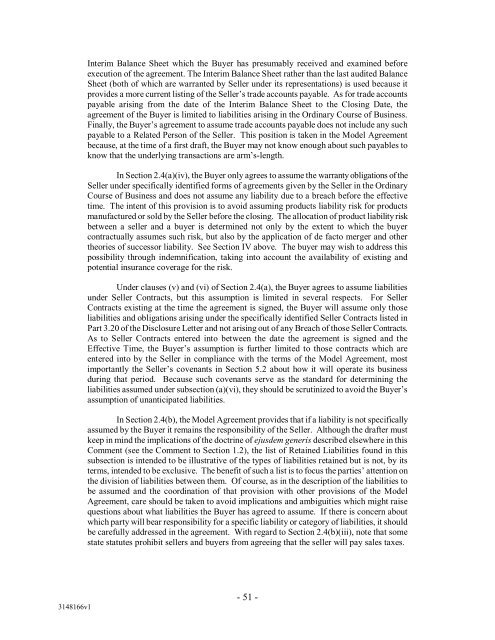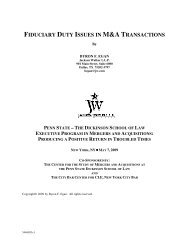asset acquisitions - Jackson Walker LLP
asset acquisitions - Jackson Walker LLP
asset acquisitions - Jackson Walker LLP
You also want an ePaper? Increase the reach of your titles
YUMPU automatically turns print PDFs into web optimized ePapers that Google loves.
Interim Balance Sheet which the Buyer has presumably received and examined beforeexecution of the agreement. The Interim Balance Sheet rather than the last audited BalanceSheet (both of which are warranted by Seller under its representations) is used because itprovides a more current listing of the Seller’s trade accounts payable. As for trade accountspayable arising from the date of the Interim Balance Sheet to the Closing Date, theagreement of the Buyer is limited to liabilities arising in the Ordinary Course of Business.Finally, the Buyer’s agreement to assume trade accounts payable does not include any suchpayable to a Related Person of the Seller. This position is taken in the Model Agreementbecause, at the time of a first draft, the Buyer may not know enough about such payables toknow that the underlying transactions are arm’s-length.In Section 2.4(a)(iv), the Buyer only agrees to assume the warranty obligations of theSeller under specifically identified forms of agreements given by the Seller in the OrdinaryCourse of Business and does not assume any liability due to a breach before the effectivetime. The intent of this provision is to avoid assuming products liability risk for productsmanufactured or sold by the Seller before the closing. The allocation of product liability riskbetween a seller and a buyer is determined not only by the extent to which the buyercontractually assumes such risk, but also by the application of de facto merger and othertheories of successor liability. See Section IV above. The buyer may wish to address thispossibility through indemnification, taking into account the availability of existing andpotential insurance coverage for the risk.Under clauses (v) and (vi) of Section 2.4(a), the Buyer agrees to assume liabilitiesunder Seller Contracts, but this assumption is limited in several respects. For SellerContracts existing at the time the agreement is signed, the Buyer will assume only thoseliabilities and obligations arising under the specifically identified Seller Contracts listed inPart 3.20 of the Disclosure Letter and not arising out of any Breach of those Seller Contracts.As to Seller Contracts entered into between the date the agreement is signed and theEffective Time, the Buyer’s assumption is further limited to those contracts which areentered into by the Seller in compliance with the terms of the Model Agreement, mostimportantly the Seller’s covenants in Section 5.2 about how it will operate its businessduring that period. Because such covenants serve as the standard for determining theliabilities assumed under subsection (a)(vi), they should be scrutinized to avoid the Buyer’sassumption of unanticipated liabilities.In Section 2.4(b), the Model Agreement provides that if a liability is not specificallyassumed by the Buyer it remains the responsibility of the Seller. Although the drafter mustkeep in mind the implications of the doctrine of ejusdem generis described elsewhere in thisComment (see the Comment to Section 1.2), the list of Retained Liabilities found in thissubsection is intended to be illustrative of the types of liabilities retained but is not, by itsterms, intended to be exclusive. The benefit of such a list is to focus the parties’ attention onthe division of liabilities between them. Of course, as in the description of the liabilities tobe assumed and the coordination of that provision with other provisions of the ModelAgreement, care should be taken to avoid implications and ambiguities which might raisequestions about what liabilities the Buyer has agreed to assume. If there is concern aboutwhich party will bear responsibility for a specific liability or category of liabilities, it shouldbe carefully addressed in the agreement. With regard to Section 2.4(b)(iii), note that somestate statutes prohibit sellers and buyers from agreeing that the seller will pay sales taxes.3148166v1- 51 -
















